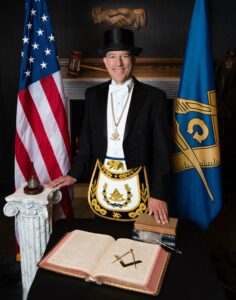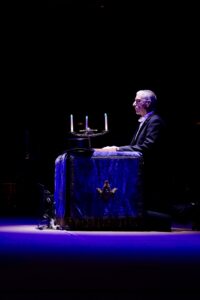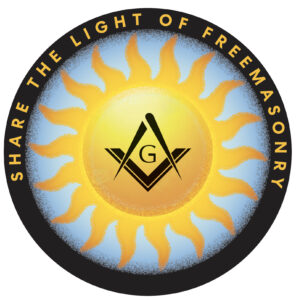Meet Grand Master G. Sean Metroka
A member of several Sierra foothill lodges, Grand Master G. Sean Metroka explains how his past experiences inform his views on Freemasonry and what he sees as the future of the fraternity.
The journey up the Grand Line typically takes four years, culminating with a term as Grand Master of Masons, should he be elected. But for newly installed Grand Master G. Sean Metroka, it was more like a lifetime spent in Masonry leading up to this moment.

Metroka, a member of several Sierra foothill lodges including Nevada No. 13, was first initiated into Masonry at Table Mountain No. 124 in Paradise in 1979, like his father before him. But he says his zeal for the fraternity can be traced even further back, to his childhood spent in DeMolay, where he rose to be a master council of his chapter and division. At just 21, he became an adult chapter advisor for the group, and years later helped launch the North Star chapter in Nevada City. In all, he has received the order’s highest honors, including the degree of Chevalier, the Cross of Honor, and the DeMolay Legion of Honor, and in 2018 was given the Grand Master’s Youth Support Award.
Following more than 30 years in the U.S. Marines and a second career as the executive officer of the state superior court of Nevada County, Metroka has been deeply involved in Masonry, serving as lodge master for Nevada No. 13, Harmony No. 164, and as assistant secretary for Mountain Range No. 18, as well as in a number of district and statewide positions with the fraternity and on several Grand Lodge boards and committees. Here, the new grand master explains how his past experiences inform his views on Freemasonry and what he sees as the future of the fraternity.
California Freemason: I understand you served with the Marines for 32 years, including in Iraq and Kuwait. What made you want to enlist in the military?
Grand Master G. Sean Metroka: I decided to go into the military because I wanted to be a pilot; I wanted to fly. And my father who was in the army in Korea in the ’50s. He always encouraged me to consider the military because he loved it so much. I fell into the Marine Corps because I had a crafty recruiter. I really wanted to join the Air Force. But when I learned more about the Marine Corps, I made that choice. I served most of my time as an artillery officer. I was deployed to Iraq twice, and I was mobilized and deployed to Kuwait in 2002 to help plan the invasion, and then when we invaded, I went into Iraq in 2003 and back again in 2006.
CFM: And you grew up in Paradise, correct? You must have been worried during the fires there.
Metroka: I was very concerned about Table Mountain Lodge when the Camp Fire destroyed that town, not only because of my connection to the lodge, but because I still had family living there. My mother lost her house. My brother and his wife lost their house and businesses. Three days after the fire went through, another Mason and friend of mine, who worked for the government at the time, was able to take me up into the town to assess the devastation, and I was overjoyed to drive by Table Mountain Lodge and see that it’s still standing.

CFM: You’re currently serving as master of Harmony Lodge No. 164 in Sierra City, in addition to being Grand Master. What’s it like juggling those two jobs?
Metroka: If only it were two. (Laughing) It’s really a lot more, but that’s another story.
CFM: What do you appreciate most about that lodge?
Metroka: There are many aspects of the lodges I belong to that are unique, almost quaint, that I really enjoy. Sierra City is a town of 225 people—it’s really too small to sustain Masonic lodge. But we love that lodge because it’s small. We all travel in from as far as two and a half hours away. And when we go there, it feels like we’re stepping back in time. The building is old; it was built in 1863. It’s a little musty. It doesn’t have heat. It barely has electric lights. But it just kind of harkens back to a time when Freemasonry was just starting in California. And we think it’s worth preserving.
CFM: Your father was a Mason too, right?
Metroka: Yes he was. But the real reason I was anxious to join Freemasonry was the influence of the advisors in DeMolay who mentored me. There were many men who did not have children in the chapter who gave their time and energy and interest to the young men who were members and I wanted to be like them. That was what really drove me.
CFM: And you’ve been really involved with the youth orders ever since.
Metroka: I have. In fact, almost from the time I was raised a Master Mason, the chapter advisory council appointed me as the chapter advisor. I was just 21, which was too young to be an effective chapter advisor. I only did that for a short while because I was I went into active duty in the Marines shortly thereafter. But when my sons got to be old enough to join DeMolay, I joined together with the master of Nevada No. 13 and several others senior DeMolays and founded a new chapter in Nevada City. And I continue to this day to be an advisor for that chapter.

CFM: Your theme for the year is “Sharing the Light of Freemasonry.” What does that mean?
Metroka: I think it’s important for our fraternity to become more commonly known and well understood, not just in our state, but around the world. And I think that if we help people to really understand what Freemasonry is and why it’s a good thing, we will be able to do more good, and more good people will come to us seeking membership.
So first of all, I want to complete the implementation of our 2025 Fraternity Plan. The three pillars of the plan directly support this theme. I also want us to change the way our lodges interact with our Masonic youth. When I was a member of DeMolay, all of our advisors were Masons. Now, very few of our advisors are Masons; mostly they are parents. And I want our lodges to take better care of their members. We have, unfortunately, a history of losing contact with our members, and then after a time suspending them because we’ve lost contact and they haven’t paid their dues. There are some things we can fix there.
CFM: What do you see as the good that Freemasonry does?
Metroka: Freemasonry is an institution that promotes moral and upright living. It promotes harmony, brotherhood, certainly relief, and truth. All of these things are needed in our society for us to live free and peacefully. And I think if more people understood that Freemasonry focuses on these virtues and can be applied to the betterment of people who are not members, they will come to us. There’s so much about Freemasonry that is misunderstood. People just stay away or say, Oh, no, I don’t want anything to do with that. If we can communicate more clearly what we do and why we do it, people will welcome us and want to come and join us.
CFM: Like you, lots of Masons have a military background. Why do you think that connection is so powerful?
Metroka: I found many similarities between my service in the military and my membership in Masonry. In fact, when I returned from my last deployment in Iraq, I started to experience some serious ill effects from that combat service. And in a great measure, I found relief in the Masonic lodge. The things that I experienced and the things that I lost, I was able to work through those thanks to the friendships I had with my brothers, many of whom were not veterans, but some whom were. And I think it’s because I have a very strong level of trust in my brothers and I could open up to them in a way I did not feel comfortable opening up to others. So I think there is a real natural connection between organizations like Freemasonry and military veterans.
CFM: You mentioned being deployed to Iraq in 2003. I assume that means you were seeing active combat at that time.
Metroka: During that deployment, while I was in Babylon, I was promoted to colonel. And so my experience would be very different from what you might imagine a private first class or lance corporal carrying a rifle would experience. But I was shot at many times. In fact, sometimes when I was in a helicopter in the air, I was shot at. So I saw a lot of death and destruction, which can’t help but affect you.
CFM: What else do you think you took away from your service?
Metroka: I’m glad you asked that. I took away from my time in the service a much clearer and deeper understanding of the essence of humanity, both good and bad. I learned that we all have the capacity for evil. We all have the ability to be horrible people. But because of our upbringing and our environment and our desire to do good, we choose the alternate path. Some people do not. But by and large, the people I met in Iraq, in Kuwait, in Bahrain, in the Far East, we’re all very similar. We all want the same things. We want a decent place to live. We want a reasonable way to make a living. We want our children to get an education. We want to live in peace and not be tyrannized by our government, or anybody else. Mostly, we want happiness. And that I think is true for human beings regardless of their circumstances and their country.
CFM: What do you think Masonry is going to look like in the near future?
Metroka: I’ll start by saying this: It is a common misconception that Freemasonry never changes. In fact, Masonry has been changing from its inception, and it has continued to change as society has advanced to meet the needs of society at the time. So in the future, Freemasonry is going to look very different than it has, even prior to the pandemic. We know it has changed greatly since the pandemic; we’re modernizing many of the ways we communicate and meet and interact with the public.
What I think’s going to happen in the future for Freemasonry is that all the various traditions in Freemasonry, some of which are quite different than our own, will begin to come together. They will begin to communicate with one another and to work together for the greater good. So what I’m talking about is in California, there are probably 20 different Masonic traditions. The three main ones are our Grand Lodge, the California Prince Hall Grand Lodge, and the Grand Lodge of Iran in Exile. But there are many others. And most of them are doing great things. If we all come together, just acknowledge one another and get to know each other and then work together where there are needs to be met, everybody will benefit. I think that change is in the offing.
—Interview by Ian A. Stewart
